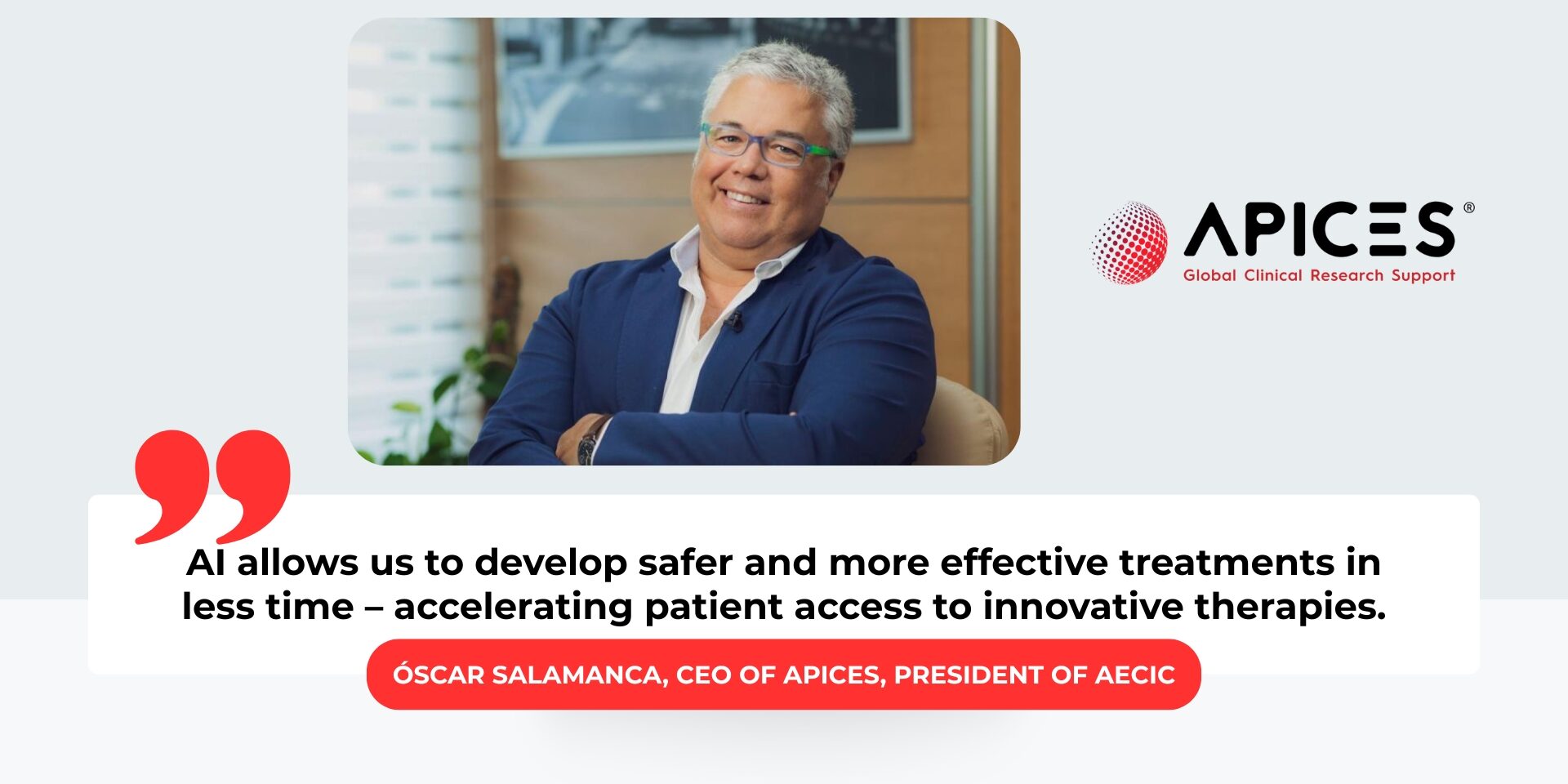Insights from Óscar Salamanca, CEO of APICES, President of the Spanish Association of Clinical Research Companies (AECIC)
Artificial intelligence (AI) is transforming the landscape of clinical research and drug development. From predictive analytics and trial optimization to patient stratification and real-world data integration, AI tools are accelerating innovation across the healthcare ecosystem. Yet as the technology advances, so do the ethical, regulatory, and methodological challenges that must be addressed to ensure its responsible and safe use in clinical studies.
Óscar Salamanca, CEO of APICES and the President of the Spanish Association of Clinical Research Companies (AECIC), shares his perspective on how AI is reshaping clinical development – and why human oversight and ethical validation remain indispensable pillars of research.
Artificial Intelligence in Clinical Trials: Progress and Challenges Ahead
Artificial intelligence is already supporting the optimization of clinical research operations, improving data management, and enabling more efficient trial execution.
According to Salamanca, “AI is helping us become more efficient and precise in how we develop clinical trials, allowing us to reduce timelines and anticipate potential risks.”
However, he also highlights that large-scale implementation will depend on clear regulatory guidance. “We are dealing with the most sensitive form of data – patient data – which requires extremely strict protection frameworks. Europe must ensure these regulations do not limit our ability to remain competitive globally in clinical trial development.”
Accelerating Drug Development Through Precision and Personalization
AI is redefining the traditional model of drug discovery and clinical testing. By integrating genomic, phenotypic, and behavioral data, it enables the design of personalized treatment strategies and adaptive protocols.
“Thanks to AI, we can tailor new drugs to the specific characteristics of each patient rather than to a generic disease,” Salamanca explains.
He points out that while the average patent life for a new molecule is 20 years, with 14 to 16 years typically spent on research and validation, these timelines are beginning to shorten. “AI allows us to develop safer and more effective treatments in less time – accelerating patient access to innovative therapies.”
Validating Artificial Intelligence as a Medical Tool: Ethics Before Technology
The use of AI in medical devices and clinical research requires rigorous scientific validation. Salamanca emphasizes that technological advancement must always remain secondary to patient safety and ethical standards.
“All systems based on AI must be validated using the scientific method – the only reliable path for ensuring the safety and efficacy of new medical products,” he says.
He adds that even after a drug or medical device reaches the market, continuous safety monitoring remains mandatory. “Post-marketing surveillance ensures ongoing patient protection and maintains confidence in the healthcare system.”
Cross-Border Collaboration and Data Sharing in Europe
The upcoming European Health Data Space (EHDS) initiative aims to create a unified framework for health-data sharing across EU member states. Salamanca views this as a crucial step forward for scientific collaboration and the advancement of precision medicine.
“Many diseases – particularly rare diseases – require patient data from multiple countries to complete clinical trials efficiently. The ability to share information across borders will make studies faster, more comprehensive, and more representative,” he explains.
Still, he warns that Europe must strike the right balance between data protection and innovation. “If regulatory systems move too slowly, we risk losing global competitiveness in clinical research.”
Ethical Artificial Intelligence and Algorithmic Transparency in Healthcare
With the growing use of wearables, smart sensors, and digital health applications, vast amounts of patient-generated data are being collected daily. Ensuring that the algorithms processing this data remain ethical, transparent, and secure is critical.
“If the safety of an algorithm cannot be guaranteed, it will not be used in clinical research,” Salamanca states firmly. “Before any AI-based tool is integrated into a clinical trial, it must be reviewed by an ethics committee and authorized by regulatory agencies such as the EMA or FDA.”
He reiterates that this strict oversight is what differentiates medical AI from other industries: “Our sector moves more slowly than marketing or finance because human lives are involved – and that’s how it should be.”
Human Oversight: The Core of Responsible Artificial Intelligence
Despite its analytical power, AI cannot replace human judgment in medicine. Salamanca insists that AI should be viewed as an assistive tool – one that enhances but never replaces the expertise of clinicians and researchers.
“Artificial intelligence does not make decisions,” he clarifies. “It provides highly processed information to help researchers make better decisions. The human factor remains essential.”
The Next Decade: Smarter, Faster, and More Ethical Research
Looking ahead, Salamanca envisions a near future where AI enhances every stage of clinical development – from study design to patient monitoring and regulatory reporting.
“We will see significant improvements in efficiency and safety, with better data aggregation to support decision-making. Researchers, clinicians, and CROs will increasingly rely on AI tools to elevate the quality of studies and improve patient experience,” he predicts.
He also anticipates a transformation in the skills required across the clinical research sector. “Sponsors, CROs, regulatory agencies, and ethics committees will need new professional profiles trained in data science, AI validation, and digital ethics. The human dimension will continue to guide how technology is used to improve health outcomes.”
Key Takeaways
- AI is revolutionizing clinical research, driving efficiency, precision, and personalization in drug development.
- Ethics and safety remain the foundation – no AI system will be used in trials without validation and regulatory approval.
- Cross-border collaboration through the European Health Data Space will accelerate innovation while maintaining data integrity.
- Human oversight is irreplaceable, ensuring that technological progress always serves patient well-being.
Planning an clinical trial in Europe? Let’s chat! Contact our business development team and schedule a call to know how APICES CRO handles the acceleration of study timelines and patient recruitment according to plan.




